In the annals of ambitious real estate ventures, Forest City unveiled in 2016 by China’s property giant Country Garden in Johor, Malaysia, stands as a testament to the dichotomy between grand dreams and stark reality. Touted as a $100 billion eco-friendly mega-project under the Belt and Road Initiative, the sprawling development promised to be a utopia with a golf course, waterpark, offices, and restaurants, envisioning housing for nearly one million people.
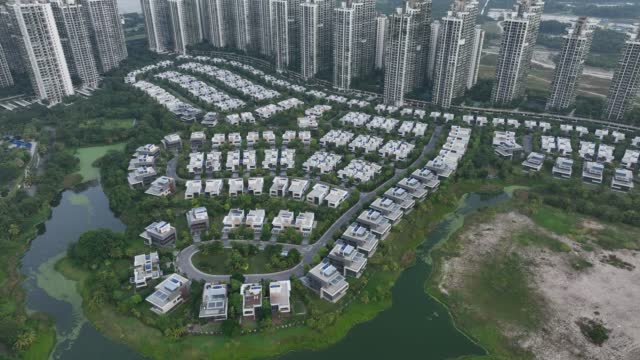
Fast forward eight years, and Forest City’s once grand vision has been eclipsed by a haunting reality. Nazmi Hanafiah, a 30-year-old IT engineer, reflects on his six months residing in Forest City with a sense of palpable unease. He describes it as a ‘ghost town,’ a lonely place where the only company is your own thoughts. This sentiment captures the essence of a development that now stands largely deserted, a far cry from the bustling metropolis it was intended to be.
Despite Country Garden’s initial optimism, Forest City’s progress has been lethargic, with only 15% of the colossal project completed. More strikingly, a mere 1% of the development is occupied, underscoring the stark contrast between promise and reality. What was once envisioned as a haven for a million lives now echoes with emptiness, prompting questions about the project’s viability and the sustainability of China’s property market.
The story of Forest City is woven into the broader narrative of China’s property market crisis. Country Garden, grappling with debts nearing $200 billion, faced setbacks beyond the borders of Malaysia. Abandoning projects in Australia became a necessity, a sign of the cracks appearing in China’s once-booming real estate sector. Government interventions, visa restrictions for Chinese buyers in Malaysia, and political uncertainties added layers of complexity to Forest City’s fate.
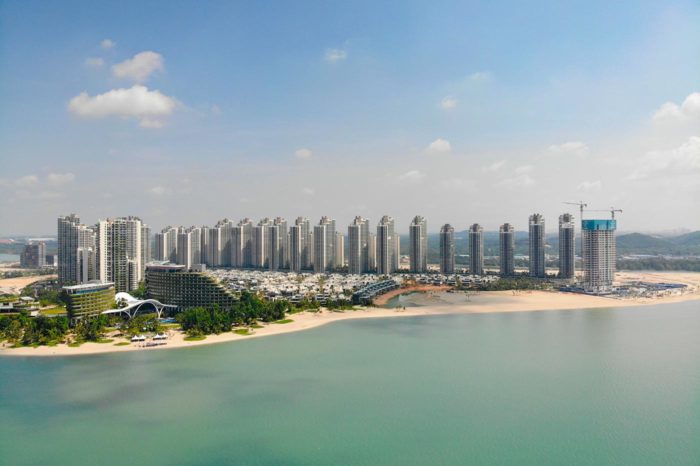
The project’s remote location on reclaimed islands, far removed from the vibrancy of Johor Bahru, earned it the moniker “Ghost City” among locals. The dream paradise for aspiring homeowners turned into an eerie landscape, punctuated by a deserted beachfront with warnings of crocodiles, an ageing shopping mall with shuttered shops, and an empty children’s train perpetually circling a desolate space. The once-promised ‘Happiness Never Ends’ now rings hollow against the silence of unoccupied towers.
Forest City’s disillusioned residents, like Nazmi Hanafiah, reflect a broader sentiment of broken promises and unmet expectations. As the Chinese government contemplates financial support for Country Garden and Forest City’s inclusion in a new special economic zone between Malaysia and Singapore, the fate of this unfinished utopia hangs in the balance.
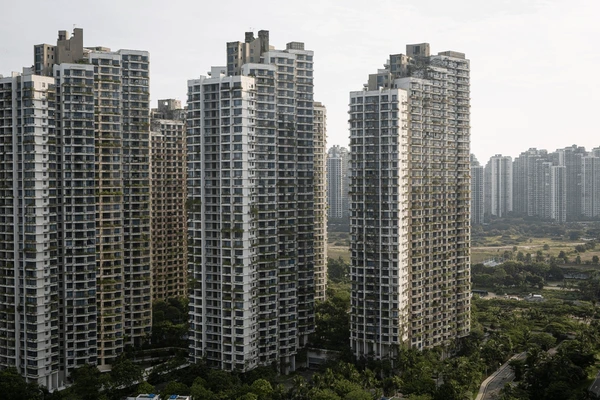
In the larger context of China’s property market crisis, Forest City serves as a cautionary tale of unchecked ambition and the importance of aligning promises with achievable outcomes. The echoes of Forest City’s haunting silence reverberate not only in the deserted corridors of its buildings but also in the broader discourse on responsible real estate development and the challenges faced by China’s real estate behemoths. The ghosts of broken promises linger, reminding us that even the grandest dreams can unravel in the face of economic uncertainties and geopolitical shifts.
Economic and Political Context in Malaysia
The economic and political factors in Malaysia contributed to many challenges in building Forest City. Explore how changes in government policies, such as visa restrictions for Chinese buyers by Prime Minister Mahathir Mohamad in 2018, impacted the project’s trajectory.
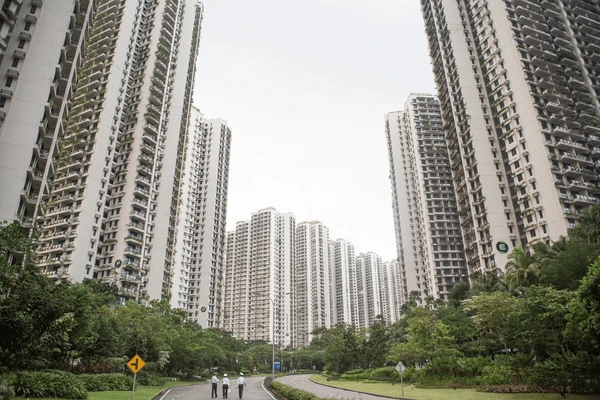
Impact of China’s Property Market Crisis for Forest City
Further elaborate on the broader context of China’s property market crisis. Examine the ripple effects of the government’s measures to curb speculation, the resulting cash flow issues for major developers like Country Garden, and the implications for ambitious projects both domestically and abroad.
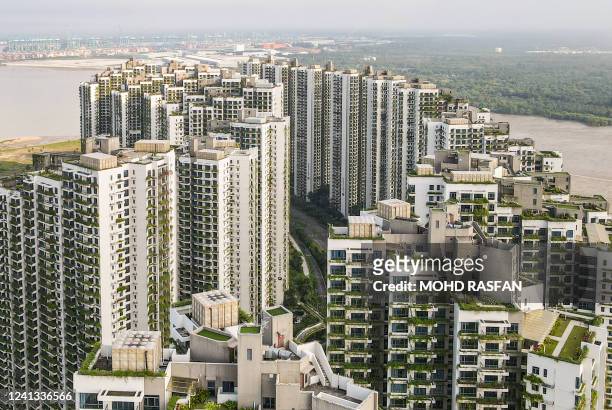
Dreams Turned to Desolation: Unveiling the Human Story of Forest City
In the heart of Johor, Malaysia, where the sea meets reclaimed land, stands the ambitious yet desolate Forest City. Once envisioned as a dream paradise under China’s Belt and Road Initiative, this sprawling $100 billion mega-project by Country Garden promised an eco-friendly metropolis, complete with a golf course, waterpark, offices, and vibrant communities. However, the reality unfolding within its towering structures and vacant streets paints a starkly different picture, leaving the few inhabitants disillusioned and the once-thriving vision now labelled a “ghost town.”
Among those who once embraced the allure of Forest City is Nazmi Hanafiah, a 30-year-old IT engineer whose journey from anticipation to escape reflects the shattered dreams of many. A year ago, Nazmi eagerly moved into a one-bedroom flat with a sea view, captivated by the promises of a second home abroad within this grand development. Little did he know that within six months, the once-promising relocation would turn into a nightmarish experience, prompting his desperate decision to leave.
“I didn’t care about my deposit, I didn’t care about the money. I just had to get out,” Nazmi confessed, his words echoing the sentiments of others who sought refuge in Forest City only to find an unsettling and desolate environment. “It’s lonely around here – it’s just you and your thoughts,” he added, encapsulating the haunting isolation that has become synonymous with Forest City.
As we navigate the eerily quiet streets, Joanne Kaur, one of the few remaining residents, paints a vivid picture of life on the 28th storey of a tower block. “Even during the day, when you step out of your front door, the corridor is dark,” she laments. The once-promised urban utopia now stands as an isolated enclave, challenging the dreams and expectations of those who envisioned a vibrant community.
Forest City, originally marketed as “a dream paradise for all mankind,” was strategically designed to attract Chinese buyers seeking investment opportunities and holiday homes. However, its remote location on reclaimed islands, far from Johor Bahru, the nearest major city, earned it the local moniker “Ghost City.” The isolated locale deterred potential tenants, leaving Forest City a mere shadow of its envisioned grandeur.
The reality on the ground reveals a scene of abandonment and desolation. The beach, once imagined as a thriving hub, is now adorned with warning signs about crocodiles, and the shopping mall, intended as a bustling centre of activity, houses shuttered shops and vacant construction sites. An empty children’s train endlessly circles the mall, playing “Heads, Shoulders, Knees and Toes” in Chinese, a surreal reminder of a vision that failed to materialize.
For those who believed in the promise of Forest City, the gap between ambition and reality has been disheartening. Initial excitement about an eco-friendly metropolis has given way to the harsh truth of incomplete living facilities, deserted public spaces, and a community struggling to take root in the barren landscape.
As we peer into the showroom of Country Garden, the developer behind Forest City, an enormous model city showcases what could have been. The sign above the sales stall declares, “Forest City. Where Happiness Never Ends.” Yet, happiness remains elusive in this desolate landscape, raising questions about the future viability of such mega-projects and the toll they take on the dreams of those who believed.
In the corridors of Forest City’s silent towers, the echoes of shattered dreams mingle with the sound of distant waves. The human story within this concrete jungle speaks of anticipation, disillusionment, and the enduring quest for a place to call home. As Forest City grapples with its uncertain future, the human dimension adds a poignant layer to the narrative, reminding us that behind every grand development lies the collective heartbeat of those who dared to dream.
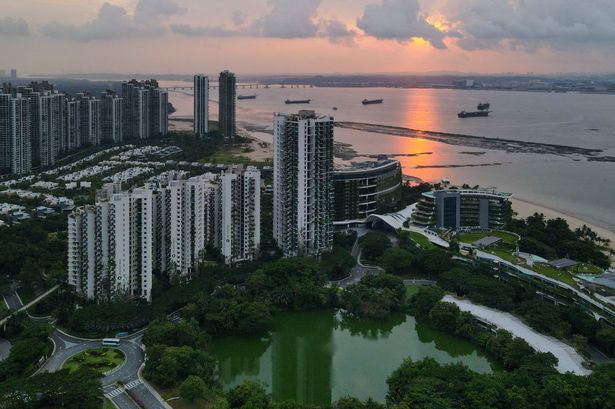
Country Garden’s Perspective: Balancing Ambition with Reality
Amid the desolation, Country Garden, the developer behind Forest City, has responded to questions about the project’s current status and prospects. In a statement to the BBC, Country Garden acknowledged the challenges faced by Forest City but remained optimistic about its completion.
While only 15% of the project has been completed after eight years, and occupancy estimates hover around a mere 1%, Country Garden insisted that the current situation in the Chinese property market, including Forest City, is mere “noise.” The company assured that its Malaysian operation continues to “run its business as usual.”
Furthermore, Country Garden pointed to plans to include Forest City in a new special economic zone between Malaysia and neighbouring Singapore, asserting that the project is “safe and stable.” This strategic move aims to position Forest City within a broader economic context, potentially mitigating some challenges faced on the ground.
In response to doubts raised about Forest City’s completion, Country Garden emphasized that the project’s slow progress and the challenges encountered are not unique to this development but reflect broader issues within the Chinese property market. The company downplayed concerns about its massive debts, approaching $200 billion, by characterizing them as part of the larger narrative of market fluctuations.
Despite the uncertainties, Country Garden has expressed confidence in Forest City’s future viability. Reports surfaced last month suggesting that the developer had been placed on a preliminary list of companies set to receive financial support from the Chinese government. However, the extent and nature of this support remain unclear, leaving room for speculation about the project’s fate.
As Forest City remains caught between the dreams of its developers and the stark reality faced by its inhabitants, the narrative takes on a more complex hue. The balancing act between ambition and reality, investor confidence and market challenges, leaves Forest City standing as a symbol of the intricate dance between development dreams and the pragmatism of the property market. The future of this once-promising paradise remains uncertain, wrapped in the aspirations and struggles of those who once believed in its potential.
Forest City in Global Perspective: Unraveling the Threads of Ambition and Reality in Mega-Developments
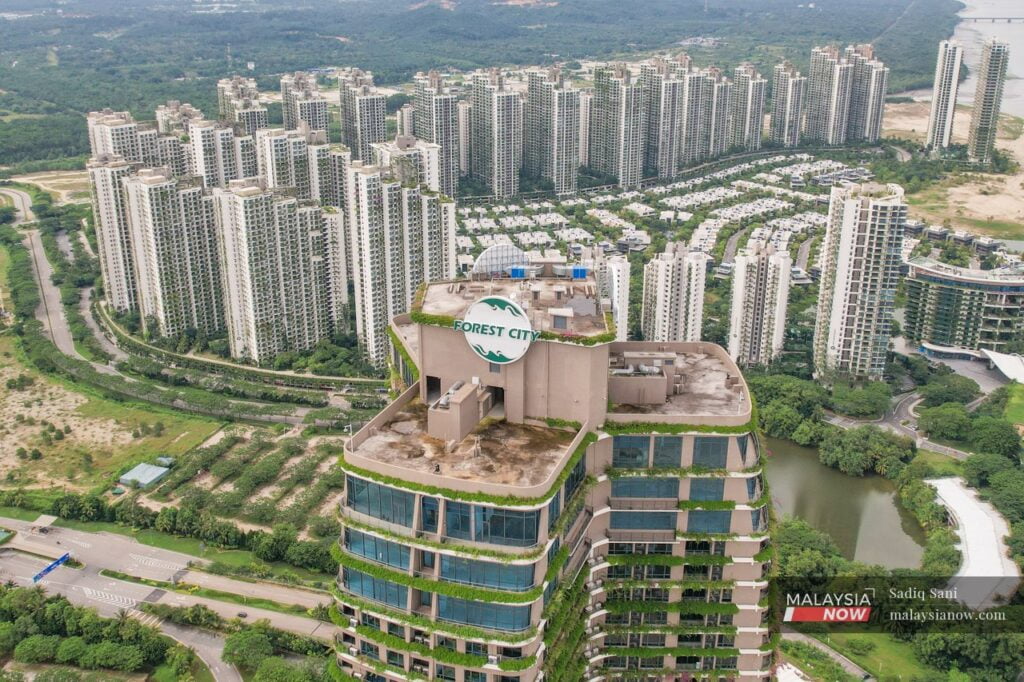
Forest City, with its ambitious vision and the subsequent challenges faced, stands not in isolation but as a microcosm of a broader trend in mega-developments worldwide. The echoes of unfulfilled promises, financial struggles, and deserted landscapes find resonance in the narratives of other grand real estate ventures globally, shedding light on the evolving dynamics of the ambitious yet precarious world of mega-projects.
Comparisons with Other Mega-Developments:
Songdo International Business District, South Korea:
- Forest City’s struggle to attract occupants finds parallels in South Korea’s Songdo International Business District. Initially touted as a futuristic smart city, Songdo faced slow occupancy rates despite substantial investment. The gap between vision and reality, along with challenges in creating a vibrant community, reflects a recurring theme.
King Abdullah Economic City, Saudi Arabia:
-
- The King Abdullah Economic City, a mega-development on the Red Sea, shares similarities with Forest City in terms of scale and ambition. However, slow progress, economic challenges, and the need for sustained investment have posed hurdles to realizing the envisioned urban utopia.
Eko Atlantic, Nigeria:
-
- In Lagos, Nigeria, Eko Atlantic emerged as a symbol of ambition, aiming to create a new city on reclaimed land. Despite showcasing glimpses of grandeur, Eko Atlantic has faced skepticism due to concerns about flooding risks and the ability to attract a diverse and sustainable community.

Common Challenges Across Mega-Developments
- Remote Locations and Accessibility:
- Forest City’s struggle with its isolated location is not unique. Mega-developments often grapple with the delicate balance between creating self-sufficient ecosystems and ensuring accessibility to major urban centres. Remote locations, as seen in Forest City, can deter potential occupants.
- Economic and Political Factors:
- Political and economic shifts impact mega-projects globally. Forest City faced visa restrictions imposed by Malaysia’s then-prime minister in 2018, disrupting plans for Chinese buyers. Similarly, mega-developments often navigate uncertainties tied to government policies and economic stability.
- Changing Dynamics in the Chinese Property Market:
- Forest City’s fate is intertwined with the broader shifts in the Chinese property market. Government interventions and changing regulations, as witnessed in 2021, have affected major developers like Country Garden. The challenges faced by Forest City reflect a larger narrative of market adjustments.
- Debt and Financial Strain:
- Forest City’s staggering debts of nearly $200 billion align with a global trend of real estate companies grappling with financial strains. The case of Evergrande, the world’s most indebted real estate company, facing a liquidation hearing in Hong Kong, highlights the widespread financial challenges in the industry.

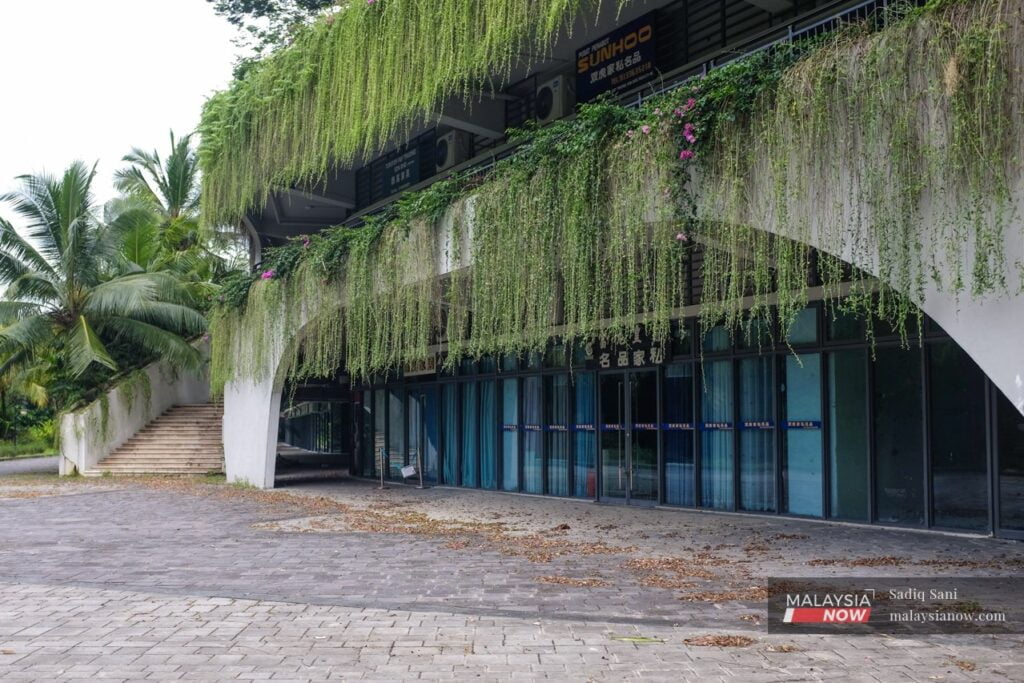
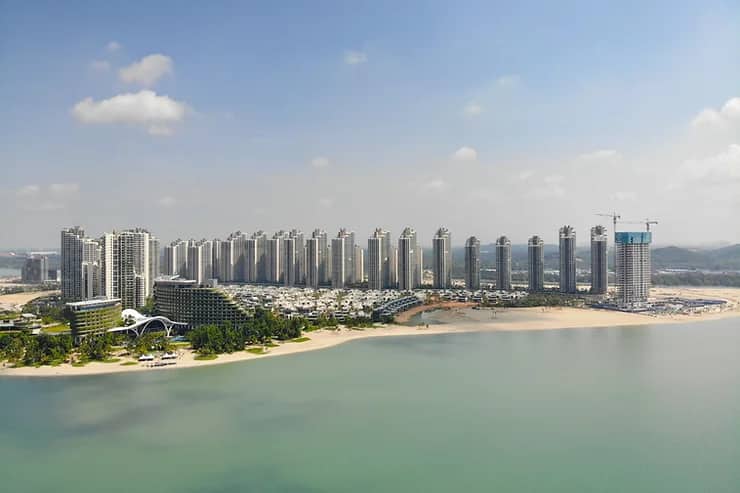
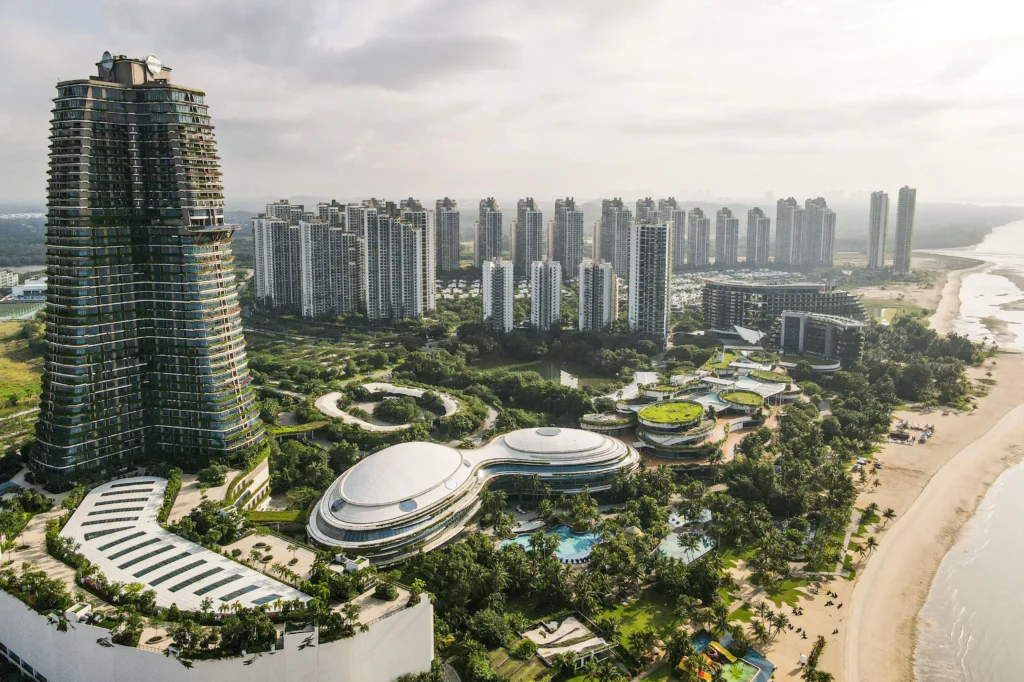
Insights into the Evolving Global Property Market
The struggles faced by Forest City and its counterparts underscore a crucial paradigm shift in the global property market. The allure of mega-developments, once seen as symbols of prosperity and innovation, now contends with a more discerning and cautious audience.
- Focus on Sustainability and Community Building:
- Mega-developments are increasingly scrutinized for their commitment to sustainability and community integration. Forest City’s isolation and perceived lack of recreational activities emphasize the growing importance of creating holistic, livable spaces beyond grand infrastructural projects.
- Navigating Economic Uncertainties:
- Economic uncertainties, showcased by Forest City’s financial challenges, highlight the need for developers to navigate volatile markets strategically. Mega-projects are no longer immune to the broader economic landscape, necessitating adaptive approaches to funding and construction.
- Government Intervention and Policy Impact:
- Forest City’s encounter with governmental visa restrictions offers a glimpse into the potential impact of political decisions on mega-developments. Developers must now consider and adapt to changing government policies, adding a layer of complexity to their ventures.
- Cautionary Tales for Investors:
- The narratives of Forest City and similar developments serve as cautionary tales for investors and developers. Due diligence, realistic expectations, and a comprehensive understanding of local dynamics are crucial in ensuring the success and sustainability of mega-projects.
In the grand tapestry of global mega-developments, Forest City emerges not as a solitary tale but as a chapter in an unfolding saga of ambition, challenges, and lessons. The evolution of such projects reflects not only the changing dynamics within the real estate sector but also the maturing perspectives of investors, governments, and the communities they aim to serve. As Forest City grapples with its destiny, it invites us to ponder the intricate dance between dreams and the pragmatism of the ever-shifting global property market. For exciting latest news visit our latest news section.
To contact us please visit our Contact Us page located in the footer menu. For more latest trendy news like this visit our Latest News page. For various needy offers and deals of the day you can check out our Best Deals page. To know more about us visit the About Us page in the footer menu. You can also read our Disclaimer, Affiliate Disclosure and FAQs page located in the footer menu. You can also find the Webstory Page in the footer menu to see our latest published web stories.
